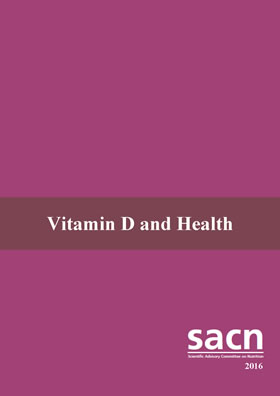| |
|
Dear Healthcare Professional,
Welcome to the September edition of our email newsletters aimed to keep you updated with the latest in infant nutrition. This month we are looking at the new vitamin D recommendations for infants and young children as a result of the recent SACN Vitamin D and Health report. We are also discussing the findings of a paper which analysed data from the Diet and Nutrition Survey of Infants and Young Children (DNSIYC) to evaluate the impact of the type of milk consumed by children aged 12-18 months on their vitamin D and iron intake and status.
Kind regards,
The SMA® Professional Team |
|
 |
|
|
|
In July, SACN published the Vitamin D and Health report in which for the first time a recommended dietary vitamin D intake for the whole population has been advised, highlighting the importance of this vitamin for health. Based on their findings, SACN now recommend vitamin D intakes of
8.5-10 µg from birth up to 1 year and 10 µg for those aged above 1 year- read the full report here.
Based on these new recommendations, Public Health England (PHE) has now updated their guidance for Vitamin D supplements for infants and young children. It is now advised that breastfed infants under 1 year of age should be given an
8.5-10 µg supplement from birth, as opposed to from 6 months. For babies fed infant formula, no supplement is required unless they are consuming less than 500ml of formula a day, as formula is fortified with Vitamin D. For those aged between 1 and 5 years, a 10 µg daily supplement is required for those consuming less than 500ml of formula milk1. To help you answer any questions parents may have, visit our website where we have the relevant PHE and SACN reports available for you to read. |
|
 |
|
|
 |
|
|
 |
|
 Vitamin D intakes of children aged 12-18 months Vitamin D intakes of children aged 12-18 months |
|
 |
|
As infants enter their second year of life, nutrition remains critically important due to continuing growth and brain development. Ensuring sufficient vitamin D status in this group is particularly important for ensuring optimal bone health, as reflected by the recent SACN report advising a recommended intake of 10 µg a day for young children consuming less than 500ml of formula milk. However, DNSIYC data has revealed that only 9% of surveyed children aged 12-18 months received a supplement and only 32% of non-breastfed children were consuming some vitamin D fortified milk which leaves a large number of infants at risk of low vitamin D intake.
Sidnell et al (2016) examined this DNSIYC data, focussing upon the impact of the main type of milk consumed on nutrient intakes. Their findings highlight the significant contribution fortified milk can make to the vitamin D intake of infants aged 12-18 months, with those consuming at least 400ml a day meeting the current requirements. Additionally, infants consuming fortified milk met requirements for iron and calcium without increasing intakes of energy, protein and saturated fat which are already high in this population. These findings suggest fortified milks can help improve the nutritional intakes of infants in their second year of life- read the full paper here. |
|
 |
|
 |
|
|
|
 SMA® PRO Toddler Milk SMA® PRO Toddler Milk |
|
National dietary surveys show that the diets of infants and toddlers in the UK and Ireland may be sub-optimal with typical diets providing excess energy and protein and not enough vitamin D and iron2 3.
SMA® PRO Toddler Milk contains a specially tailored combination of nutrients for toddlers to help young children achieve the recommended intakes of iron, calcium and Vitamin D together with a balanced diet. As highlighted in the Sidnell et al (2016) paper, toddlers who consume fortified milks such as SMA® PRO Toddler Milk, have higher mean intakes of vitamin D and iron, and a lower intake of protein than those who mainly consume cows' milk4. |
|
|
® Registered Trademark.
IMPORTANT NOTICE: The World Health Organization recommends exclusive breastfeeding during the first 6 months of life and continued breastfeeding for as long as possible. SMA PRO Toddler Milk is suitable for young children from 1-3 years, as part of a healthy balanced diet and it is not a breast milk substitute.
References: 1. Scientific Advisory Committee on Nutrition (SACN). (2016) Vitamin D and Health Report. Available here. 2. Gibson, S and Sidnell, A. (2014) Nutrient adequacy and imbalance among young children aged 1-3 years in the UK. Nutrient Bulletin. 39, 172-180. 3. Irish Universities Nutrition Alliance. National Pre-School Nutrition Survey. Summary Report. www.iuna.net: Dublin: IUNA, 2012 4. Sidnell et al (2016) Nutrient intakes and iron and vitamin D status differ depending on main milk consumed by UK children aged 12-18 months- secondary analysis from the Diet and Nutrition Survey of Infants and Young Children. Journal of Nutritional Science. 5 (32) 1-8. |
|
 |
|
|
|
|